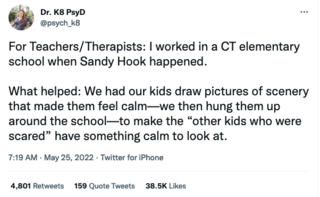Trauma
Supporting Kids After a School Shooting
Tips for caregivers navigating difficult conversations and decisions.
Posted June 3, 2022 Reviewed by Ekua Hagan
Key points
- Caregivers play an important role in supporting children navigate difficult emotions after mass shootings.
- Children may exhibit changes in behavior that can be compassionately supported by parents and educators.
- Parents and educators can work together to help kids gently transition back into school after a mass shooting.
Our families are again living the collective trauma of seeing children murdered in their schools. During these times of deep pain, fear, and uncertainty, our spirits may feel broken, alone and fearful.
Although it takes extra effort, it is important to foster a sense of shared humanity and connection, supporting kids to grow into loving and compassionate individuals and nourishing our communities’ needs to promote healing and connection, not more fear and disconnection.
Supporting kids after shootings
As parents and caregivers, we are living our worst nightmares. As parents, we have to adjust to the risks our kids are exposed to on a daily basis, but mass shootings in schools are a risk that is extremely difficult to accept.
Here are some things to keep in mind as you navigate supporting your family:
- Remember that although they're becoming more common, mass shootings are still relatively rare.
- It’s important that we, as caregivers, tend to our mental health and well-being so we can be present and support our children.
- For young children who may not be hearing this news, there is no need for them to learn about this incident at this time. However, don’t assume your child is not hearing about this news in child care centers or other places, as many of us are often unaware of children being around us when we discuss sensitive topics.
- If your child has heard the news or is likely to hear the news, then listen and observe more than you talk.
- Let them guide the conversations as much as possible. Take into account their developmental stage and their ability to process information. Answer their questions little by little, allowing them to process the information, ask more questions or share their thoughts.
- Remind them they can come back to ask more questions. Remind them they are safe, here and now. Let them know what steps you or their school are taking to support their safety.
- Collaborate with them to create a list of activities that could be helpful if and when their emotions become overwhelming.
- Remind them that their feelings are valid—whatever they are feeling is a positive sign of their humanity and their ability to value life and each other.
- Explicitly name ways they can be supportive, toward themselves (coping skills), to the family (ask for help when needed), and to others and their communities. Altruism is a healthy coping mechanism that can foster a sense of collective healing in times of trauma and uncertainty.
Supporting kids transitioning back to school
- After incidents of violence and trauma, kids may display changes in their behavior as they navigate complex emotions they may not have the tools to express or navigate more “effectively” as expected by adults. Expect some changes in sleep, eating, and overall activity patterns. They may be afraid to sleep by themselves or separate from you. Support them through these feelings without judgment, most kids will return to their baseline after a few days to weeks.
- It is important that both parents and educators open up spaces to discuss traumatic events, allowing children to express their needs and involve them in problem-solving on how to navigate their challenges. Do not pretend nothing has happened, as kids may perceive this as a lack of permission to grieve and express their feelings.
- Maintaining a sense of normalcy through routines can be helpful for most kids. However, maintaining normalcy by returning to campus after a school shooting complicates this for families. Dr. Howard Liu, psychiatrist and Chair of Psychiatry at the University of Nebraska Medical Center emphasizes not to force kids back to school. Instead, he reminds us that kids should be “eased into school with support of additional school and mental health staff.” Dr. Liu also notes the importance of school personnel receiving trauma-informed practice training to support these transitions and possible emotional needs that arise after these traumatic events.
- Remember that although most people experience trauma symptoms after a traumatic event, the majority of us will not go on to develop a mental health condition such as post-traumatic stress disorder. Trauma symptoms include trouble sleeping, nightmares, feeling unsafe, or that you are hyper-aware of your surroundings. We may also experience sadness, fear, and anger and most importantly, we may feel disconnected or mistrustful of others.
- After incidents of trauma and community violence, kids may find it meaningful to know how they can be helpful. At home, you can explicitly name ways they can support the family through the recovery process by asking them to share their feelings, ask for help, etc. Outside of the home, the family can be involved with volunteer activities that promote social connection. Dr. Katelyn Campbell, a psychologist who worked in a school in Connecticut, shared that “older kids actually wanted to contribute by writing letters to politicians, or doing a group letter that they signed. We also would offer older kids the option to 'buddy' or mentor a younger child who was nervous in school.” She noted that kids want to feel helpful and educators can empower them by “finding creative ways for them to feel like they could make a difference.”
- Don’t forget that school administrators and teachers may be available to facilitate a gentle re-introduction to school, so reach out and ask. Both Dr. Campbell and Dr. Liu emphasized this point; parents should not feel alone in helping their kids ease back into school.
For school administrators and educators

- Kids and parents will want to know what precautions will be taken by the school to prevent future incidents.
- Expect behaviors related to anxiety, fear, and uncertainty. Have a plan on how to compassionately support kids as they transition back into school.
- Create spaces for kids to express their feelings. Younger kids may enjoy drawing and coloring with specific prompts to paint positive images that bring peace, calm, and joy. Older kids may benefit from movement activities that invite reflection, emotional regulation, and social connection.
- Remember that trauma responses can last a few days, weeks, months, or years. Each child is different. Reach out to local mental health providers to collaborate in supportive efforts if you need to expand programming at your school. Trauma-informed care and socioemotional learning practices can be beneficial to supporting children’s mental health and are particularly beneficial when used before and after traumatic events occur, not just immediately after a tragedy happens.
- As loving, caring adults, we must refuse to accept school shootings as our “new normal” and support efforts to protect our children by restricting access to firearms. Our kids have been demanding action for decades and we continue to let them down. As loving, collaborative, and intelligent adults, let’s process our feelings and turn them into action to bring safety into our homes, schools, and communities.
A shorter version of this post was also published in the San Antonio Express News.


